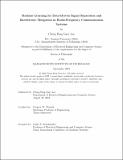Machine Learning for Data-Driven Signal Separation and Interference Mitigation in Radio-Frequency Communication Systems
Author(s)
Lee, Cheng Feng Gary
DownloadThesis PDF (44.64Mb)
Advisor
Wornell, Gregory W.
Terms of use
Metadata
Show full item recordAbstract
Single-channel source separation for radio-frequency (RF) systems is a challenging problem relevant to key applications, including wireless communications, radar, and spectrum monitoring. This thesis addresses the challenge by focusing on data-driven approaches for source separation, leveraging datasets of sample realizations when source models are not explicitly provided. To this end, deep learning techniques are employed as function approximators for source separation, with models trained using available data. Two problem abstractions are studied as benchmarks for our proposed deep-learning approaches. Through a simplified problem involving Orthogonal Frequency Division Multiplexing (OFDM), we reveal the limitations of existing deep learning solutions and suggest modifications that account for the signal modality for improved performance. Further, we study the impact of time shifts on the formulation of an optimal estimator for cyclostationary Gaussian time series, serving as a performance lower bound for evaluating data-driven methods. The thesis also introduces the “RFChallenge” as a benchmarking platform, aimed at addressing the gap in current literature for a comprehensive comparison of emerging machine learning solutions for RF signal separation. Finally, we explore an alternative approach of using deep learning to train a library of individual signal models that can be used together for subsequent inference tasks. While showing promise as a scalable strategy for the problem, our preliminary findings uncover the practical limitations of such methods. Ultimately, this thesis seeks to provide insights into judicious choices of data-driven solution architecture based on the signal structures under consideration. Our findings aim to stimulate further research at the intersection of machine learning and RF system design, contributing to the development of next-generation wireless technology through data-driven methodologies.
Date issued
2023-09Department
Massachusetts Institute of Technology. Department of Electrical Engineering and Computer SciencePublisher
Massachusetts Institute of Technology